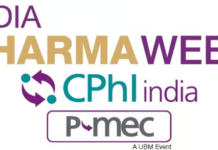Project to be launched across 1,233 villages in Mandla by January 2017
· Sun Pharma Establishes FDEC-India to Implement Mandla Malaria Elimination Demonstration Project
· Agreement allows other Govt or Private Stakeholders to join the Mandla project or similar project in partnership with FDEC-INDIA
· Lessons learned from Mandla project would be useful for eliminating malaria in rest of Madhya Pradesh and India
New Delhi, November 17, 2016: Sun Pharma (Reuters: SUN.BO, Bloomberg: SUNP IN, NSE: SUNPHARMA, BSE: 524715, “Sun Pharma” including its subsidiaries or associate companies) today announced the signing of tri-party agreement between Indian Council of Medical Research, Govt of Madhya Pradesh and Foundation for Disease Elimination and Control of India (FDEC- INDIA) to launch the Malaria Free India demonstration project in Mandla district of Madhya Pradesh.
The Foundation for Disease Elimination and Control of India (FDEC-INDIA) has been established by Sun Pharma for disease elimination and control initiatives as part of its CSR programme. The Malaria Free India initiative was announced in April 2016 as part of the broader MOU signed between ICMR and Sun Pharma for development of translational health sciences and disease control & elimination. ICMR’s National Institute for Research in Tribal Health is one of it’s permanent national institute situated in Jabalpur, Madhya Pradesh with the mandate to plan, conduct and coordinate research on specific health problems and health needs of the tribals. The Institute is also WHO Collaborative Centre for the Health of the Indigenous populations.
According to the Agreement signed, NIRTH, Govt of MP and FDEC-India will jointly accomplish the goals of malaria elimination from Mandla district and prevent re-introduction by use of vector control (Indoor residual spray and/or use of insecticide treated long-lasting bednets (LLINs) and case management (rapid on-the-spot diagnosis and prompt treatment) as per national and/or WHO norms of malaria elimination efforts. FDEC-India will be responsible for implementation of the Project in an independent manner in collaboration with NIRTH/ICMR, Govt of MP and all appropriate stakeholders. It will execute the malaria elimination project over a span of 3 to 5 years covering 1,233 villages in Mandla district. The Malaria Free India demonstration project in Mandla is expected to be launched by January 2017.
Commenting on the agreement signed, Mr Dilip Shanghvi, Managing Director, Sun Pharma, “Sun Pharma has established FDEC-India with a goal to work on health initiatives relevant to national health program in collaboration with appropriate stakeholders with a view to eliminate and control diseases. The Public-Private-Partnership agreement signed today is an important step towards elimination of Malaria from India by 2030. Sun Pharma is excited to be part of this significant public health initiative, which will save lives, prevent illness and improve economic conditions of communities that are impacted by malaria.”
According to Dr. S.Y. Quraishi, Chairman of the Foundation for Disease Elimination and Control of India (FDEC-India), “I am pleased that FDEC-India is taking the first step for eliminating malaria in India. Sun Pharma, which has established FDEC-India, deserves to be congratulated. Malaria elimination has been recognized as a global priority and a target of 2030 has been established for elimination. With the signing of the agreement with Govt. of MP and ICMR, we are starting malaria elimination project. The Public-Private-Partnership between FDEC-India, ICMR and Govt. of MP is an important strategy to meet health challenges and I hope other organizations will join FDEC-India in this and future health initiatives”
According to Dr. Soumya Swaminathan, Secretary Department of Health Research, Director General Indian Council of Medical Research Ministry of Health and Family Welfare, Government of India, “I congratulate National Institute for Research in Tribal Health, Sun Pharma’s Foundation for Disease Elimination and Control of India and Government of Madhya Pradesh for starting malaria elimination project in Mandla. Using field tested and proven tools of vector control, case management by rapid diagnosis and prompt treatment this program aims to able to eliminate malaria from Mandla district. Intensive community engagement through community meetings, local markets, school children, women etc will be an important component of this Programme. ICMR will actively participate and extend full logistic and technical support. The lessons learned from this demonstration project will be useful for scaling up malaria elimination program in the rest of the state and the country.”
According to Dr. Pallavi Jain Govil, Commissioner Health, Madhya Pradesh, “Malaria exerts an enormous economic and social burden on the affected population groups, individuals and communities. In the light of malaria being an entirely preventable disease, efforts need to be intensified for the prevention, control and elimination of malaria. I congratulate Indian Council of Medical Research & FDEC-INDIA for their support for elimination of malaria from Mandla district. Mandla is a tribal dominated district located in the hilly areas with difficult terrain. Mandla comprises of numerous rivers and endowed with rich forest. The district is endemic for malaria. The state is already on the way of elimination of malaria in Mandla district, with the interventions as early detection of malaria by rapid diagnostic test and complete treatment of malaria along with effective vector control measures like supply of LLINs in the subcenters with API 5 and above & spray operation in the areas with API 1 to 4.9. Technical support in terms of vector study and epidemiological evaluation of malaria by Indian Council of Medical Research and additional support by FDEC- INDIA in surveillance operation, IEC, behaviour change communication, vector control along with supply of antimalarials would help the state to eliminate malaria from Mandla district. I hope with the intensified joint efforts of all the three partners malaria will be eliminated from Mandla district and would be a presentable model for replication in the other districts of state and other parts of the country.”
The agreement signed today also allows:
1. ICMR, Ministry of Health Madhya Pradesh or some other States in India to tie-up with FDEC- INDIA for other public health works or working towards eradication/elimination of disease of national importance or other infectious or chronic disease.
2. Any other government, semi government organization or institutions to join the Malaria Free India (Mandla) Project or agree with FDEC-INDIA to develop similar projects for eradication of communicable diseases, chronic diseases or any other similar objective.
3. Any other public or private entity, stakeholder, or organization to participate in the Malaria Free India (Mandla) Project and become Party to the PPP by contributing efforts, resources or funding for the Project.
Government of India has shown strong regional leadership on Malaria, in helping to guide the region towards endorsement of the Asia Pacific Leaders Malaria Alliance (hereinafter referred to as “APLMA”) Roadmap in November 2015. Within just three months, the Ministry of Health and Family Welfare launched “The National Framework for Malaria Elimination in India” and set the target of elimination of malaria in India as 2030. According to WHO estimates, India contributes about 70% of malaria cases in South East Asia Regional countries. India has the highest number of deaths outside the African continent, with approximately 181.3 million at high risk and 997.4 million people at low and high risk. Malaria has been shown to impede development, saving and investment, worker productivity, and per-capita gross domestic product. Malaria has also been shown to promote school and workplace absenteeism. It has been shown that there is a strong correlation between malaria and poverty, and malaria endemic countries have lower rates of economic growth.
Corporate Comm India(CCI Newswire)
























